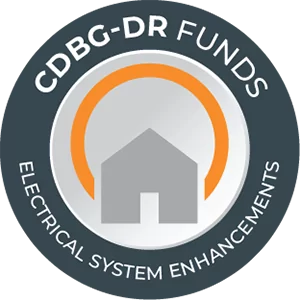The Puerto Rico Department of Housing (PRDOH) has been designated by the Government of Puerto Rico as the entity responsible for administering the federal CDBG-DR and CDBG-MIT funds on the Island. The U.S. Department of Housing and Urban Development (HUD) is the federal agency that oversees these funds and the various programs.
Under the Office of Disaster Recovery’s CDBG-DR/MIT Funds, PRDOH administers, implements and oversees the operation of these allocations. It is committed to administering them in an efficient, transparent, and responsible manner to facilitate Puerto Rico’s recovery from the disasters that have occurred and the possible risks it faces due to its geographic location.
PRDOH has the financial management systems, policies, practices and procedures necessary to maintain fiscal responsibility as demonstrated to HUD. As such, they utilize their oversight procedures, systems and strategies that encompass cross-cutting regulatory requirements, including HUD regulations, civil rights, environmental regulations, labor standards, fair housing, citizen participation and documentation.
The Community Development Block Grant-Disaster Recovery (CDBG-DR) funds assist in the recovery from the disasters caused by Hurricanes Irma and María in 2017; this includes long-term recovery, housing restoration, economic infrastructure and revitalization. Meanwhile, the CDBG-MIT mitigation funds to strengthen the Island before the risks it faces due to its location in the Caribbean.
CDBG-DR
Due to the impact caused by hurricanes Irma and Maria, Puerto Rico received an allocation of CDBG-DR funds. This grant is being used to address the reconstruction needs of affected families, small businesses, and infrastructure. It also provides assistance for the planning and economic development that is needed to achieve a wholesome recovery.
CDBG-MIT
The inhabitants of Puerto Rico have faced and recovered from a great number of natural disasters. A Risk Assessment led by the Puerto Rico Department of Housing identified eighteen (18) risks to which the Island is vulnerable due to its location within the Caribbean. To prepare the people against these threats and to strengthen the seven (7) lifelines that support the Island’s recurring needs, there is a CDBG-MIT funds allocation.
CDBG-DR Energy Systems Enhancements
Hurricanes Irma and Maria caused the longest electrical disruption in U.S. modern history. This prevented Puerto Rico residents from accessing essential services and is currently causing that the recovery cycle remains incomplete. For said reason, in 2021, Puerto Rico received a CDBG-DR funds allocation meant to enhance and improve its electrical system.
CDBG-DR Earthquakes 2019-2020 and Storm Isaías 2020
In order to repair or rebuild properties that have suffered substantial damage from the 2019-2020 earthquakes and storm Isaías 2020, a special allocation to CDBG-DR recovery funds was created with the ReSURge Program. The housing needs of the municipalities of Guánica, Guayanilla, Lajas, Peñuelas, Ponce and Yauco will be addressed and administered by the Southern Consortium for the Management and Administration of Federal Funds for Earthquake Damage (ConSur).
Fiona Hurricane and 2022 Floods
Puerto Rico was affected by heavy rains and a hurricane, resulting in severe flooding and landslides. As recovery needs in Puerto Rico increase with each disaster, a coordinated approach between agencies and local governments is further required to better allocate resources to meet the needs of communities. The persistence of these challenges caused by nature demands a collective response, emphasizing the importance of investing in resilient infrastructure and strategic risk management. The areas identified require immediate attention, not only to address current problems, but also to fortify against future natural disasters. As Puerto Rico faces these critical infrastructure challenges, it becomes critical to prioritize the safety and accessibility of communities, ensuring a more resilient future for all.








